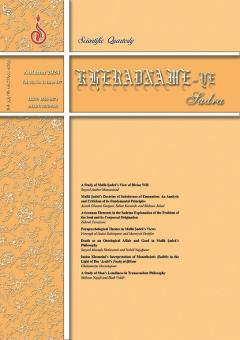Parapsychological Themes in Mullā Ṣadrā’s Views
Subject Areas : ملاصدراپژوهی و اندیشۀ حکمت متعالیهForough al-Sadat Rahimpour 1 , Marziyeh Dezhfar 2
1 - Associate Professor, Islamic Philosophy and Kalam Department, University of Isfahan, Isfahan, Iran
2 - PhD candidate of Transcendent Philosophy, University of Isfahan, Isfahan, Iran
Keywords: Parapsychology, union of the intellect and intelligible, Mullā Ṣadrā, Transcendent Philosophy,
Abstract :
Parapsychological studies aim to explain those parapsychological human powers that cannot be explored through employing common scientific methods. This paper, investigates the themes and background of this discipline in Mullā Ṣadrā’s views by using library resources and following a comparative approach. The findings of the study indicate that parapsychological studies can be compared with the discussions of the faculties of the soul and the truth of prophethood in the works of Islamic philosophers. Both Mullā Ṣadrā and parapsychologists believe that the process of gaining awareness is possible through certain ways such as honest dreams and meditation. Moreover, Mullā Ṣadrā’s views regarding some discussion including the union of the intellect and intelligible and the relationship among the various levels of existence are similar to Western scientists’ explanations of certain problems such as telepathy and the effects of the mind on matter. The roles of some effective factors in parapsychological phenomena, including concentration and reduction of the soul’s involvement in acquiring hidden awareness have been emphasized by both Mullā Ṣadrā and parapsychologists. Mullā Ṣadrā has often used intellectual and deductive methods in explaining parapsychological affairs, while parapsychologists use empirical methods in most cases. Besides, the treatment dimension of parapsychology has mainly attracted the attention of scientists during the recent centuries, while Mullā Ṣadrā has not paid much attention to this aspect of related studies.
